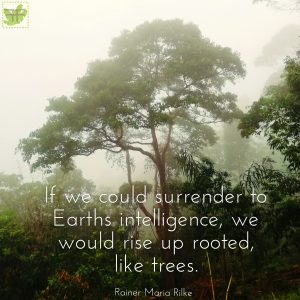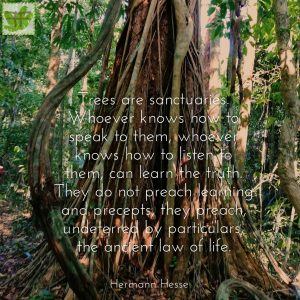
Deep Ecology is an ecological and environmental philosophy that promotes the inherent worth of all living beings, regardless of their instrumental utility to human needs. It stands in direct contrast to the dominant, anthropocentric worldview which has its origin in the agricultural mindset that emerged at the dawn of civilization 8,000 years ago. Since the current paradigm clearly doesn’t work in the long term and in the wider ecological context (think about Climate Breakdown and the Sixth Mass Extinction Event, caused by “civilized” humans trough deforestation, habitat destruction, topsoil erosion, mining, industry, pollution, etc.), a radical re-structuring of modern human societies is needed to cope with the changes we’ve already inflicted on our environment. This restructuring should to happen in accordance with Deep Ecology’s conclusions, namely to rewild communities to place them back into their ecological context – drawing inspiration from indigenous communities all over the world. The insights of Deep Ecology are by no means new! Primitive people have known all this since the beginning of time (if you ask them) or since at least a few hundred thousand years, if not longer (if you ask an anthropologist). Aboriginal cultures all over the world have not forgotten where their place in the cosmos is, they see the bigger picture clearer than most scholars and thinkers today, and they still live within their unique ecological context to this very day (at least at the fringes, where civilization hasn’t wiped them out yet).
Deep ecology argues that the natural world is a subtle balance of complex inter-relationships in which the existence of organisms is dependent on the existence of others within ecosystems. Human interference with or destruction of the natural world poses a threat therefore not only to humans but to all organisms constituting the natural community. The most obvious example is deforestation – the holocaust waged against living, thriving forest communities, that causes streams to dry up and living soil to be carried into the ocean, that stops rain clouds from forming, and that kills billions of living creatures as well as the entire landscapes they inhabit. Once you reach a certain threshold, a ‘Tipping Point’, ecosystems tend to rapidly switch from a complex to a more simple state, losing most of their biodiversity and resilience in the process. We are about to witness this in the Amazon, where rampant deforestation will very soon cause the turnover from moist rainforest to semi-arid savanna. We have witnessed it with underwater forests – coral reefs – around the world.
Deep ecology’s core principle is the belief that the living environment as a whole should be respected and regarded as having moral and legal rights to live and flourish. “Bees as pollinators” is a popular example where the main concern usually lays in how we humans will get enough food to continue doing what we do (namely destroying the environment), so engineers and capitalists come up with “solutions” like building robot bees or using wage-slaves to manually pollinate fruit trees. Of course, the loss of the most efficient pollinators would not only affect humans (and, obviously, plants) but most other mammals, directly or indirectly, as well as many reptiles and insects. Other living beings are more than just “resources”, they are friends and foes, colleagues and competitors; but most importantly, they are relatives, they are kin. Again, indigenous people have known this all along. We have all been born to the same Great Mother, and we are all her children. We all contain the same minerals and elements that have been cycled and recycled since the beginning of time. She loves none more than the other: the tiniest ant no less than the blue whale and the lichen no less than the redwood tree; and she provides all her children with everything we need.
What makes Deep Ecology “deep” is that it looks more deeply into the actual reality of humanity’s relationship with the natural world and includes feelings, emotions and spirituality, and therefore arrives at philosophically more profound (“deep”) conclusions about ecology itself than the prevailing, reductionist ecology – which is merely a cold and “rational” science, a branch of biology.

Deep Ecology is the opposite of the anthropocentric environmentalism (which is concerned with conservation of the environment only for exploitation by and for human purposes) perpetuated by the UN, David Attenborough, Greenpeace and WWF, since deep ecology is grounded in a radically different set of philosophical assumptions.
Deep ecology takes a more holistic view of the world human beings live in and seeks to apply to life the understanding that the separate parts of the ecosystem (including humans) function as a whole – much like James Lovelock’s Gaia Hypothesis. It provides an ideal foundation for the environmental, ecology, neo-animist, eco-radical, green anarchist, and anarcho-primitivist movements and has fostered and encouraged a new system of environmental ethics, views, and ideas advocating wilderness preservation, human population control, simple living, rewilding, and rediscovering spirituality and connectedness.
Arborphilia
Trees are wonderful beings.

The most beautiful tree in the area
They are probably the most altruistic beings, they give a lot and take little. They give us oxygen to breathe, filter water for us to drink, gift us with their fruit, leaves, trunks, branches and roots. They live for hundreds, sometimes thousands of years, and often withstand events that would be intolerable to other species, such as severe droughts or wildfires.
Climbing is one of the best (if not THE best) all-round workouts and makes you strong and flexible. People who climb often have a deep passionate connection for Nature, in fact this is one of the reasons you often hear when you ask why people like climbing. It makes you feel connected to Nature, and if you climb a tree it makes you feel connected to the tree. If you are harvesting fruit, the deep joy of the harvest might make you feel thankful for the gifts that this tree is giving you and the wonders that took place to allow this – the tree makes delicious fruit from nothing but earth, air and sunlight, and the bees and earthworms and bugs all helped.
While climbing it may happen that the tree even communicates with you: if you listen carefully and pay attention, most trees warn you before a branch is going to break under your weight: like a person that carries a heavy load the tree groans/creeks to show you he can’t hold you much longer.
Paul Shepard wrote in his book “Coming Home to the Pleistocene” that we humans, as former primate climbers, may still be “subject psychologically to instinctive arborphilia, in which safety and all good things are up.”

More and more data suggests that plants have indeed a form of intelligence, can communicate (for example over an internet-like network of fungi) and even have certain character traits. Mother trees recognize and nurture their own offspring, and often there are egalitarian strategies applied in inter- and intraspecific plant-to-plant relationships – which stands in contrast to the traditional notion that trees only compete against each other for light, nutrients, water, etc. (also called ‘survival of the fittest‘).
Above the ground capitalism rules. But in the ground, a socialist network dominates.
Ecosexuality is a term characterized by the authors of the book “Ecosexuality – When Nature Inspires the Arts of Love“. For us it basically means falling in love with the Earth – as opposed to seeing the Earth as a lifeless object, to be exploited for human use. The anthropocentric worldview is the enemy of ecosexuality, since it sees only humans as main protagonists of the universe and the world as merely a playground that can be manipulated to fit ones desires.
Even if you acknowledge – not appreciate, acknowledge – Nature for giving us air to breathe and water to drink, this is not enough.
Charles Eisenstein writes:
The lover does not say, “I care about you because without you, who would do my laundry?” Love is for who the beloved is, in and of themselves. To have a beloved then, one must see their “is-ness.” Our ideology has blinded us to the beingness of the planet and to most of what lives in it and on it. To love Earth, we must see it as a subject not an object. Objectification of women, some say, is a key prerequisite for rape. The same must be true of the planet.
It means falling in love with the Earth again. Let’s not forget that once we all were in love with the Earth, as it is still the case among primitive people who haven’t lost the connection to Nature that is inherent in all of us.




















![[English version below]
ช่วงนี้ลูกเนยถั่วออกเยอะมากๆเก็บกินแทบไม่ทัน😅
นี่เก็บจากต้นเดียวเอง เป็นผลไม้จากทวีปอเมริกาใต้อีกชนิดหนึ่งที่เรามีในสวน กินอร่อยจริง รสชาติสมชื่อ คือเหมือนกินเมล็ดถั่วกับเนยในลูกเดียว ต้นนี้ปลูกง่าย โตเร็ว ชอบอากาศร้อนชื้นและแห้งแล้ง ลูกสุกเปลี่ยนสีเป็นสีแดงตามรูปเลย เนื้อนุ่มเคี้ยวละมุนในปากแต่เนื้อค่อนข้างติดเมล็ด😋 ปลูกแค่2-3ปีก็ออกลูกให้กินแล้วเผลอๆอาจจะแค่ปีกว่าๆก็ออกลูกได้แล้ว ถ้าขยันดูแลดีเป็นพิเศษ😅 ตอนที่นั่งกินทำให้มีความรู้สึกเหมือนกำลังกินขนมหรือลูกอม เพราะกินสนุก กินอร่อยๆ และปลอดภัยต่อสุขภาพแบบเกินร้อยถ้าเทียบกับขนมตัวจริง😅 เด็กๆกินได้ผู้ใหญ่ก็กินได้ต้นนี้เลย ต้นเนยถั่ว😋
ปล. หากท่านใดสนใจอยากได้เมล็ดพันธุ์ติดต่อสวนเราได้จ้า😍 มีเยอะคะช่วงนี้😀 เราจัดส่งเมล็ดให้ฟรีๆเพียงแค่คุณต้องจ่ายค่าส่งเองเท่านั้น อยากได้เมล็ดเม้นท์ใต้โพสต์หรือส่งข้อความหาเราได้เลยคะ😍
The peanut butter tree gifts us generously this year - after only three years, we finally harvest enough to eat as much as we would like to. We spread the seeds by throwing handfuls around in the upper half of the garden, and since they sprout pretty easily we will have plenty more in the years to come, and there's gonna be plenty of leftovers for the birds as well (who also really enjoy peanut butter fruit, but only occasionally get to eat a fruit we missed) 😊
#permaculture #peanutbutterfruit #healthysnack #slowfood #junglelife](https://scontent-sin6-4.cdninstagram.com/v/t51.29350-15/283300740_155802276938680_7664917016698200906_n.webp?stp=dst-jpg&_nc_cat=101&ccb=1-7&_nc_sid=8ae9d6&_nc_ohc=fWTX5D0N1VUAX9Wlb-G&_nc_ht=scontent-sin6-4.cdninstagram.com&edm=ANo9K5cEAAAA&oh=00_AT-NxLhSMBjV6-esVM29Z7t4UHCbZjoFcBYeowWnf2IdIg&oe=628F14D4)
![[English version below]
ช่วงนี้ลูกเนยถั่วออกเยอะมากๆเก็บกินแทบไม่ทัน😅
นี่เก็บจากต้นเดียวเอง เป็นผลไม้จากทวีปอเมริกาใต้อีกชนิดหนึ่งที่เรามีในสวน กินอร่อยจริง รสชาติสมชื่อ คือเหมือนกินเมล็ดถั่วกับเนยในลูกเดียว ต้นนี้ปลูกง่าย โตเร็ว ชอบอากาศร้อนชื้นและแห้งแล้ง ลูกสุกเปลี่ยนสีเป็นสีแดงตามรูปเลย เนื้อนุ่มเคี้ยวละมุนในปากแต่เนื้อค่อนข้างติดเมล็ด😋 ปลูกแค่2-3ปีก็ออกลูกให้กินแล้วเผลอๆอาจจะแค่ปีกว่าๆก็ออกลูกได้แล้ว ถ้าขยันดูแลดีเป็นพิเศษ😅 ตอนที่นั่งกินทำให้มีความรู้สึกเหมือนกำลังกินขนมหรือลูกอม เพราะกินสนุก กินอร่อยๆ และปลอดภัยต่อสุขภาพแบบเกินร้อยถ้าเทียบกับขนมตัวจริง😅 เด็กๆกินได้ผู้ใหญ่ก็กินได้ต้นนี้เลย ต้นเนยถั่ว😋
ปล. หากท่านใดสนใจอยากได้เมล็ดพันธุ์ติดต่อสวนเราได้จ้า😍 มีเยอะคะช่วงนี้😀 เราจัดส่งเมล็ดให้ฟรีๆเพียงแค่คุณต้องจ่ายค่าส่งเองเท่านั้น อยากได้เมล็ดเม้นท์ใต้โพสต์หรือส่งข้อความหาเราได้เลยคะ😍
The peanut butter tree gifts us generously this year - after only three years, we finally harvest enough to eat as much as we would like to. We spread the seeds by throwing handfuls around in the upper half of the garden, and since they sprout pretty easily we will have plenty more in the years to come, and there's gonna be plenty of leftovers for the birds as well (who also really enjoy peanut butter fruit, but only occasionally get to eat a fruit we missed) 😊
#permaculture #peanutbutterfruit #healthysnack #slowfood #junglelife](https://scontent-sin6-1.cdninstagram.com/v/t51.29350-15/281748280_711057433442587_7897669658700971285_n.webp?stp=dst-jpg&_nc_cat=111&ccb=1-7&_nc_sid=8ae9d6&_nc_ohc=5Wgi4EpwkV0AX8FBOiS&_nc_ht=scontent-sin6-1.cdninstagram.com&edm=ANo9K5cEAAAA&oh=00_AT8ex-gNO2q9J-QODVZZWxwSI6bqpMjqDd1Qr1Ji7mQ3Hw&oe=62906D82)
![[English version below]
ช่วงนี้ลูกเนยถั่วออกเยอะมากๆเก็บกินแทบไม่ทัน😅
นี่เก็บจากต้นเดียวเอง เป็นผลไม้จากทวีปอเมริกาใต้อีกชนิดหนึ่งที่เรามีในสวน กินอร่อยจริง รสชาติสมชื่อ คือเหมือนกินเมล็ดถั่วกับเนยในลูกเดียว ต้นนี้ปลูกง่าย โตเร็ว ชอบอากาศร้อนชื้นและแห้งแล้ง ลูกสุกเปลี่ยนสีเป็นสีแดงตามรูปเลย เนื้อนุ่มเคี้ยวละมุนในปากแต่เนื้อค่อนข้างติดเมล็ด😋 ปลูกแค่2-3ปีก็ออกลูกให้กินแล้วเผลอๆอาจจะแค่ปีกว่าๆก็ออกลูกได้แล้ว ถ้าขยันดูแลดีเป็นพิเศษ😅 ตอนที่นั่งกินทำให้มีความรู้สึกเหมือนกำลังกินขนมหรือลูกอม เพราะกินสนุก กินอร่อยๆ และปลอดภัยต่อสุขภาพแบบเกินร้อยถ้าเทียบกับขนมตัวจริง😅 เด็กๆกินได้ผู้ใหญ่ก็กินได้ต้นนี้เลย ต้นเนยถั่ว😋
ปล. หากท่านใดสนใจอยากได้เมล็ดพันธุ์ติดต่อสวนเราได้จ้า😍 มีเยอะคะช่วงนี้😀 เราจัดส่งเมล็ดให้ฟรีๆเพียงแค่คุณต้องจ่ายค่าส่งเองเท่านั้น อยากได้เมล็ดเม้นท์ใต้โพสต์หรือส่งข้อความหาเราได้เลยคะ😍
The peanut butter tree gifts us generously this year - after only three years, we finally harvest enough to eat as much as we would like to. We spread the seeds by throwing handfuls around in the upper half of the garden, and since they sprout pretty easily we will have plenty more in the years to come, and there's gonna be plenty of leftovers for the birds as well (who also really enjoy peanut butter fruit, but only occasionally get to eat a fruit we missed) 😊
#permaculture #peanutbutterfruit #healthysnack #slowfood #junglelife](https://scontent-sin6-3.cdninstagram.com/v/t51.29350-15/281872908_168143295660521_2987194449941779810_n.webp?stp=dst-jpg&_nc_cat=106&ccb=1-7&_nc_sid=8ae9d6&_nc_ohc=GK8ricbSfgIAX8ZbpMH&_nc_ht=scontent-sin6-3.cdninstagram.com&edm=ANo9K5cEAAAA&oh=00_AT8nW1-qCG5_lEoJuLeeMxsi9mh5yYVuZI-qlgv86RVIgA&oe=628F1714)
![[English version below]
จำปาดะ (ผลไม้อีกชนิดหนึ่งในตระกูลขนุน) ต้นนี้ที่อยู่ข้างบ้านของเรา ออกดอกติดผลให้กินมากขึ้นในแต่ล่ะปี ตอนนี้ต้นกำลังออกดอก แต่ดูเหมือนว่าจำปาดะจะติดเยอะมากปีนี้ (เย่) อยากกินแล้วน๊า!! 😋
The cempedak tree besides our house gifts us with more and more abundance each year - she just started flowering, but it already looks like it's gonna be a good year for cempedak! Can't wait!!
#cempedak #artocarpus #abundance #foodjungle #permaculture #junglelife #subsistencefarming](https://feunfoo.org/wp-content/uploads/2022/02/273890094_1026327931566679_2121004513380987491_n.jpg)
![[English version below]
มะวานที่พวกเราเราขึ้นไปเอาข้าวให้ไก่และดูพระอาทิตย์ตก พอดีถือโทรศัพท์ติดตัวไปด้วย และนี่ก็คือวิวยามเย็นสวยสุดๆที่ได้เห็นกัน! เหตุที่หมอกทั้งหนาและสูงถึงเพียงนี้ก็คือ ฝนตกทั้งวันแล้วก็หยุดตกก่อนจะมืดค่ำ มันแปลกมากๆ เพราะนี่มันกำลังจะเข้าฤดูร้อนแล้ว แต่มันเป็นเรื่องดีมากสำหรับพืชสวน ต้นไม้ต่างก็มีความสุขกัน พวกเราเองก็ไม่ต้องรดน้ำผักไปอีกอาทิตย์หนึ่งเลยทีเดียว!
ช่วงไม่กี่เดือนมานี้อาจจะไม่ค่อยเห็นพวกเราอัพเดตเรื่องราวของสวนลงในสังคมอออนไลน์เท่าไหร่ มีเหตุผลอยู่ว่า ไม่อยากจะพกพาโทรศัพท์ติดตัวตลอดและอยากจะสนุกเพลิดเพลินไปกับสิ่งที่พวกเราทำกัน แทนที่จะมัวขบคิดว่ามันจะดูยังไงในรูปถ่าย แต่ยังไงพวกเราก็คงจะมาอัตเดตกันบ่อยขึ้นหลังจากนี้ ถ้ามีเวลาและแรงบันดาลใจ😄
Yesterday we finally had our phone with us again when we went to feed the chicken/watch the sunset, and this is what we were rewarded with! It rained the whole day and just cleared up before dusk - very strange, considering that it's dry season. Well, the garden loves it, the trees are happy, and we don't have to water our vegetables for at least another week!
We've been rather quiet on social media for the past few months, for no particular reason other than that we don't want to carry around our phone all the time, and just enjoy things instead of thinking how they would look like on camera 😀 Call it a partial digital detox! 😁 Well, maybe from now on we'll post more regularly, if we find the time and motivation 😜
#slowlife #sunset #permaculture #hillpeople
#junglelife #panorama #foodjungle](https://feunfoo.org/wp-content/uploads/2022/02/273822326_165241689169172_8620684220343524182_n.jpg)

No comments.